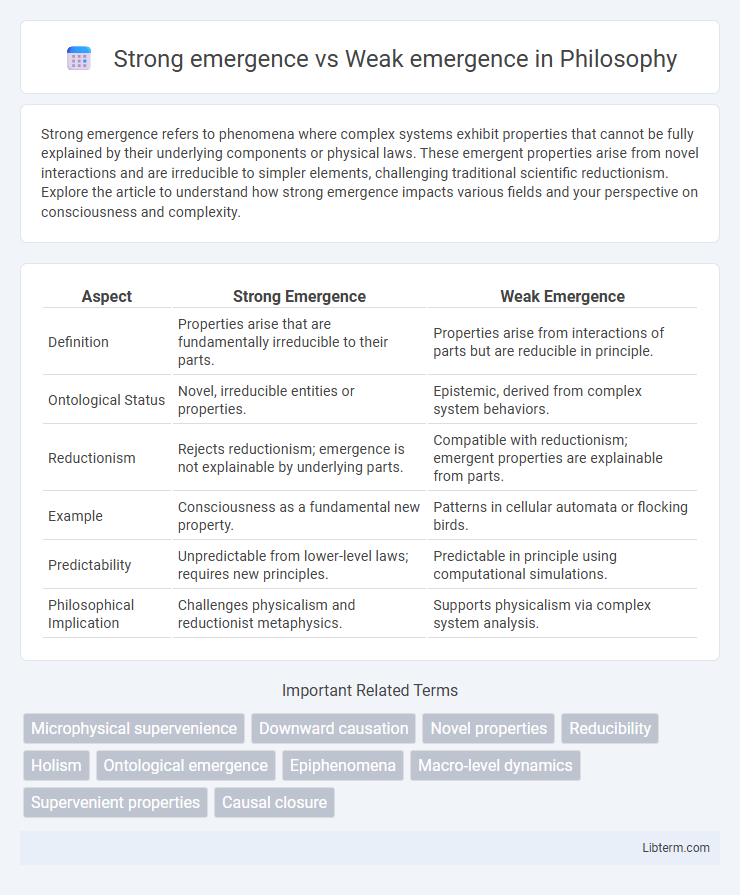Strong emergence refers to phenomena where complex systems exhibit properties that cannot be fully explained by their underlying components or physical laws. These emergent properties arise from novel interactions and are irreducible to simpler elements, challenging traditional scientific reductionism. Explore the article to understand how strong emergence impacts various fields and your perspective on consciousness and complexity.
Table of Comparison
| Aspect | Strong Emergence | Weak Emergence |
|---|---|---|
| Definition | Properties arise that are fundamentally irreducible to their parts. | Properties arise from interactions of parts but are reducible in principle. |
| Ontological Status | Novel, irreducible entities or properties. | Epistemic, derived from complex system behaviors. |
| Reductionism | Rejects reductionism; emergence is not explainable by underlying parts. | Compatible with reductionism; emergent properties are explainable from parts. |
| Example | Consciousness as a fundamental new property. | Patterns in cellular automata or flocking birds. |
| Predictability | Unpredictable from lower-level laws; requires new principles. | Predictable in principle using computational simulations. |
| Philosophical Implication | Challenges physicalism and reductionist metaphysics. | Supports physicalism via complex system analysis. |
Introduction to Emergence
Emergence refers to phenomena where complex systems exhibit properties not evident from their individual components alone. Strong emergence occurs when these higher-level properties are fundamentally irreducible and cannot be predicted even with complete knowledge of lower-level processes. Weak emergence describes system behaviors that, while unexpected, can still be derived from underlying interactions through computational or analytical methods.
Defining Strong Emergence
Strong emergence describes phenomena where higher-level properties arise that cannot be predicted or explained solely by understanding their lower-level components, exhibiting fundamentally novel causal powers. These emergent properties are irreducible and exert downward causation, influencing the behavior of underlying parts in a non-derivative way. Strong emergence contrasts with weak emergence, where higher-level phenomena are fully explainable through interactions of simpler elements and computationally derivable from micro-level rules.
Understanding Weak Emergence
Weak emergence describes complex system behaviors arising from simple interactions among components, where macro-level properties can be predicted from micro-level rules through simulation or computation. Unlike strong emergence, weak emergence does not imply fundamentally novel causal powers beyond underlying processes but highlights the difficulty of deriving system properties analytically. Studying weak emergence is crucial for modeling phenomena in fields like physics, biology, and artificial intelligence by bridging micro-level mechanisms and observable patterns.
Key Differences Between Strong and Weak Emergence
Strong emergence describes phenomena where higher-level properties are fundamentally irreducible to and unpredictable from lower-level processes, often implying novel causal powers. Weak emergence refers to properties that arise from the interactions of simpler components but remain derivable and explainable through detailed analysis of those components. The key difference lies in predictability and reducibility: strong emergence challenges reductionism and computational simulation, whereas weak emergence aligns with it by allowing complex behaviors to be understood through underlying mechanisms.
Philosophical Foundations of Emergent Phenomena
Strong emergence refers to phenomena where higher-level properties arise that cannot be fully explained or predicted by the underlying lower-level processes, suggesting novel causal powers and ontological irreducibility. Weak emergence, in contrast, describes complex behaviors that emerge from simple interactions but remain theoretically reducible and explainable through the base components and their rules. The philosophical foundation of emergent phenomena debates whether emergent properties represent genuinely new ontological categories or are merely epistemic features reflecting limitations in human understanding.
Examples of Strong Emergence in Science
Strong emergence exemplifies phenomena like consciousness arising from neural processes, where subjective experience cannot be reduced to brain activity alone. Quantum entanglement displays strong emergence through non-local correlations that defy classical explanation and cannot be predicted from individual particle properties. The origin of life represents a strong emergent event since biological properties emerge that are not straightforwardly derivable from chemistry or physics alone.
Instances of Weak Emergence in Nature
Weak emergence occurs when complex system behaviors arise from simple interactions of components, evident in natural phenomena like flocking birds, ant colonies, and neural networks. These instances demonstrate how local rules and interactions lead to unpredictable global patterns without invoking fundamentally new properties. Understanding weak emergence helps explain adaptive behaviors and self-organization in biology, physics, and social systems.
Criticisms and Challenges to Emergence Theories
Strong emergence faces criticism for its reliance on non-reducible properties that supposedly cannot be explained by underlying physical processes, leading to debates on its scientific testability and metaphysical implications. Weak emergence is challenged for potentially being epistemic rather than ontological, as emergent properties might be seen as complex but ultimately derivable from micro-level interactions, raising questions about the novelty and explanatory power of emergence. Both perspectives struggle with providing precise criteria and empirical methods to distinguish genuinely novel emergent phenomena from complex but reducible system behaviors.
Implications of Emergence in Consciousness Studies
Strong emergence implies that conscious experiences arise from brain processes in ways that cannot be predicted or explained by physical components alone, challenging reductionist neuroscience. Weak emergence suggests consciousness results from complex interactions within neural networks, which can, in principle, be modeled or simulated through physical laws. These distinctions influence philosophical debates on whether consciousness is a fundamental new property or an understandable outcome of neural complexity, impacting research directions in cognitive science and artificial intelligence.
Future Directions in Emergence Research
Future directions in emergence research emphasize advancing computational models to better differentiate strong emergence, where novel properties irreducibly arise, from weak emergence, which can be derived from underlying micro-level interactions. Integrating interdisciplinary approaches from complex systems theory, neuroscience, and quantum mechanics is expected to drive breakthroughs in identifying emergent phenomena's causal powers. Enhanced empirical validation through high-resolution simulations and experimental data will refine theoretical frameworks, promoting practical applications in artificial intelligence and systems biology.
Strong emergence Infographic

 libterm.com
libterm.com